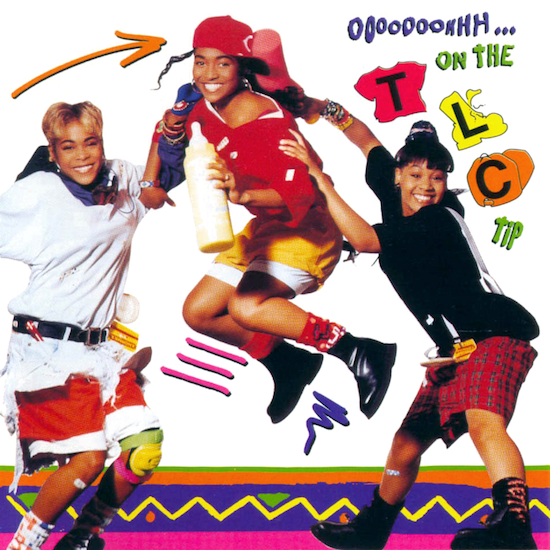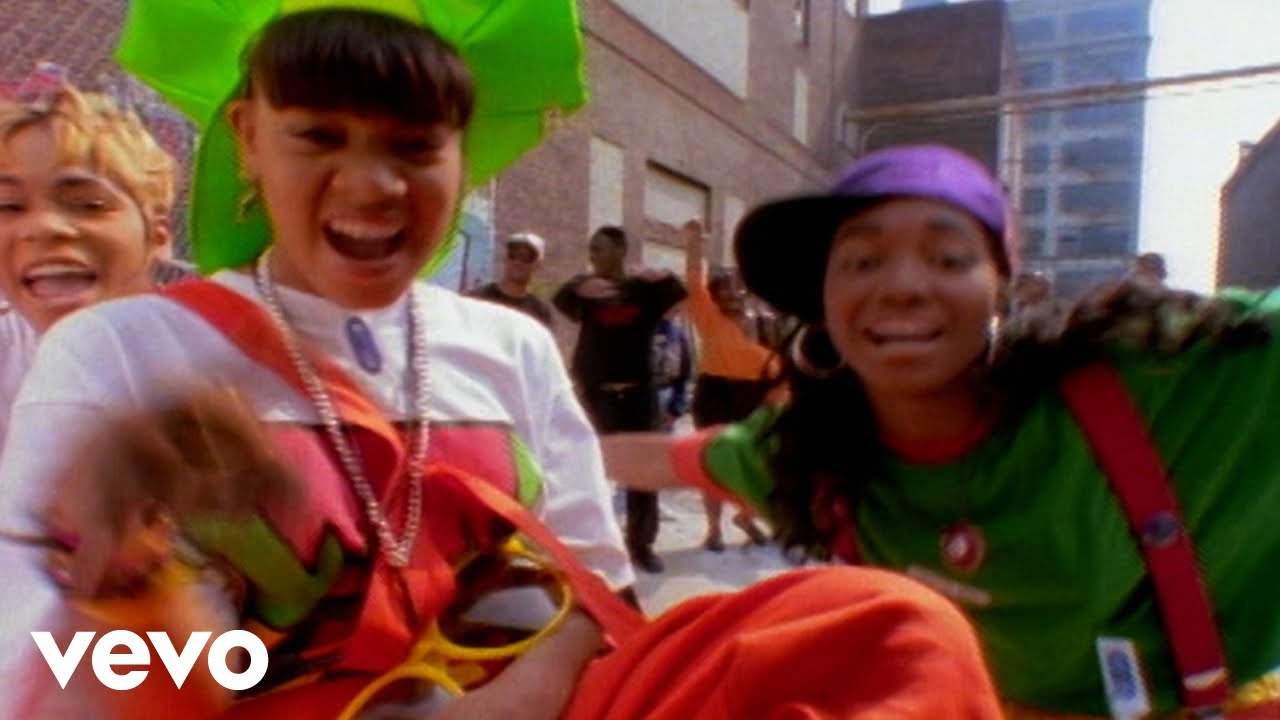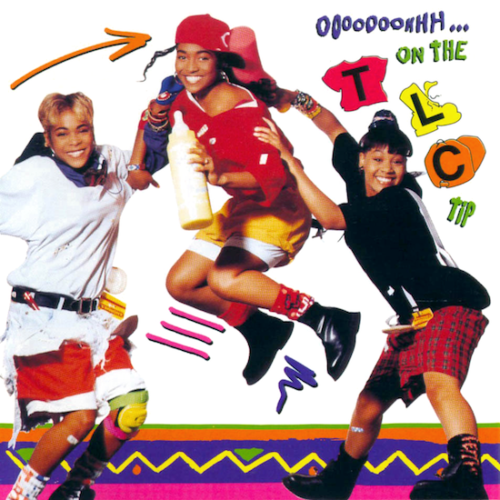Dominated by the late rapper Lisa Lopes, TLC are one of the most confounding acts to enter the US mainstream. In the early 90s, this trio upended expectations of what an all-female group should sound like: they projected both obscene aggression and innocence, blending vulgar lyrics with sweet musicality. Their first album was scrappy and belligerent, punctured by syncopated rants and startling bursts of noise. In their videos, they maintained a ferociously sexual image without removing a stitch of clothing.
Since TLC are one of the most commercially successful female bands of all time, it′s surprising that they have not been more influential. Their 1992 debut, Ooooooohhh… On The TLC Tip, is a flurry of high spirits and bawdy antics, raucous voices breaking with excitement. The lyrics are sexually uninhibited and wittily allusive, yet these women retain the aura of hopped-up kids, giggling themselves into hysterics. In most of the songs, lewdness is inseparable from a sense of playtime fun; at the same time, a stream of erotic references reminds us that the band is definitely adult.
Two decades on, this album is as mysterious as ever, with its disorienting shifts of tone. One moment the girls are screeching with laughter, then they′re making the crassest of sexual invitations – but when a chorus approaches, their voices rise and become supple and womanly. Lopes′ rapping segues into the harmonies of two singers: a tough, husky alto (Tionne ″T-Boz″ Watkins) and a light mezzo (Rozonda ″Chilli″ Thomas). In their bright, baggy clothing, these twenty-something women resemble teenage boys, but part of their posturing is to convince us that, beneath all the armour and androgyny, they have young spirits which need tender care.
However, even as they move us with their sweetness, the women are boisterous and uncontrollable. By today′s standards, TLC are not particularly suggestive, but they have a way of switching between mature and childish sexuality which is anarchic. The record suggests a world where no boundaries exist between genders and age groups: there is only the energy of wilful, hormonally raging individuals.
On several tracks, the voices of Lopes and T-Boz are so thick that we can imagine their explicit loud mouths, leering at this or that. The three women are like bragging boys who have never been quieted by adolescence – they remain extrovert and overbearing. It′s a ″craziness″ that little girls who are fans of Pink and Bratz dolls might relate to, but taken in a much more idiosyncratic direction. Lopes has a wild laugh which sounds like a teenage snicker, but also the crowing of an old guttersnipe.
That sound is used to startling effect in the group′s breakthrough single, ′Ain’t 2 Proud 2 Beg′. This signature track, written by Lopes and producer Dallas Austin, is really an extraordinary achievement: it′s a mass of conflicting voices set to a huge, complex jive of rhythms. Lopes′ voice in this song is both ardent and sniping: she gives us an insider′s lowdown, which also has the instructive tone of a sex-ed class. The combination is appropriate for a song about sexual uncertainty: a mix of braggadocio and vulnerability, as well as a plea for the downright horny.
Lopes starts the track with typical swagger, but within seconds, the point of view changes to that of a teenage introvert. The girls chide a culture which pressures teens to be sexually active, and the bullying voices which make them feel inadequate. At this point the song appears sympathetic to the introvert, siding with personal convictions over image. Yet as it turns out, peer pressure may be justified: to our surprise, ″How can you be happy alone?″ is posed as a rhetorical question, as Lopes gears up for an ode to sexual prowess.
Could it be that the fear of being an outcast is as good a motivation as any? There is no clear separation between what the speaker wants and what society demands, since the rhythm melds the two together. Then the song rises and what follows is a tremendously hesitating and sensitive bridge, almost maidenly in its yearning (″When I need 2 feel love … And I want 2 be touched / And feeling so much″). The loveliness of this melody is unexpected, yet it bubbles up so instinctively that it seems like a logical extension of the previous argument.
Lopes follows up the chorus with a posturing speech. But, as occurs so often with this artist, a monologue suddenly shifts into multiple voices and is complicated by indecision. She begins with a kind of nonsense didacticism (″Realize the realism of reality″), but at the end of the verse, she switches to a very direct overture: ″Yeah, I like it when you [smooching sound] both sets of lips / Ooooooohhh… on the TLC tip″. This has got to be the dirtiest of ″oohs″, but it also has a little of the disco ″ooh″ mixed in. The fact that this record packs in so many sounds with specific associations means that each phrase is bursting with possible readings. The songs vocalize and give equal weight to contrary opinions, then interrupt them with odd effects. Lopes combines the sexual inspection common in hip hop (″2 inches or a yard / Rock hard or if it′s saggin′″) with a self-effacing gentleness, but in the next moment she flips the tone and does a spoof of girlie behaviour.
This album is full of sounds which are both precise and difficult to pinpoint. In ′Das Da Way We Like ′Em′, Lopes breaks out into a filthy laugh somewhere between an old lech and a witch. When she utters a sappy line like ″I like a man with romance in his heart″, she makes a noise so peculiar (″chrk chrk″) that it throws off the entire verse. That sound is inexplicable, a little shrieking effect which gives us an internal flutter. It′s too weird just to be a parody of a clucking boyfriend: the song takes a detour into high-pitched animalism. We are also distracted by the fact that the intensity of her voice gathers in unusual spots, so that the phrase ″takin′ a reason, addin′ season″ turns into a jagged little swirl.
Even with a motor-mouth like Lopes up front, TLC rely heavily on non-verbal cues and sounds that ″speak″. The classical harmonies which open ′What About Your Friends′ are powerful yet turbulent: the resonance of their combined voices suggests a spinning surface, never still. On ′This Is How It Should Be Done′, the title phrase is stretched out so that a quivering belies the assertiveness of the words. As in most TLC tracks, the chorus displays a degree of reticence, but that mood is soon rejigged and overwhelmed by new effects.
These are songs of many minds: in ′Das Da Way′, Lopes uses the poet′s device of making a proposition, then cutting in with new lines and after-thoughts. Just as a declaration is unfolding, she hurries it away with a qualification such as ″But wait a minute″ or ″But on the serious tip″ – although when she says the latter, we can′t help but think it′s an allusion to the TLC tip, and therefore a signifier of pleasure as well as reflection. On ′What About Your Friends′, Lopes again flirts with gravity, but this time her high-horse tack is clearly a conceit (″So to speak / Hypothetically, say / I supply creativity″).
Ooooooohhh… On The TLC Tip has a sensational album cover: it shows the three singers in vibrant colours, leaping with joy, like kids in an inflatable castle. Condoms are everywhere, flipping out of belts, but the girls don′t seem self-conscious about this. On the back cover, they grin with delight as a strip of bright yellow rubbers juts out from Lopes′ shorts. The entire sleeve is a riot of funhouse sexual imagery, with latex peeking out of every available space. The girls wear loose clothing, since their bodies are not on show – far from it. They are swathed in layers, with fluorescent knee pads and Band-Aids worn as allusions to sexual protection. This luridly coloured safety gear draws on a kiddie sense of fun – the pamphlet features childish kisses and scrawls – as well as safe-sex messages. The images are a perfect match for the music, openly playing with the connotations of immaturity while dealing in ribald innuendo.
I haven′t seen a sleeve that was such a lively mass of codes other than in the case of Prince, but while his notes are presented as the jottings of a Picasso-like genius – and the comparison is justified – there is nothing ″masterly″ about TLC′s presentation. We get the sense of peering into a very fertile universe, where borders are easily confused. After all, this group has a baby-faced singer with a predilection for cackling like a crone. Lopes represents a disturbing and perverse sexuality, worked effortlessly into the mainstream.
Today, TLC′s first album seems impossibly complex, filled with contradictory voices. Current female artists may be marketed as ″crazy″, but this tends to be about projecting an image rather than delving into creative chaos. More than ever, performers are compelled to stay on brand, avoiding the paradoxes that might make their work fascinating.
Listening to Ooooooohhh… On The TLC Tip 25 years later, it′s dismaying to hear Lopes once again proclaim, ″Yeah come on, 1992, TLC kickin′ off…″ Why didn′t music take that leap forward – why didn′t this record become a new template rather than an anomaly? TLC embody so many distinctive moods: a sexuality dominated by madness, a world in which hysteria is part of the emotional spectrum of both sexes, the bravado of boys as performed by a band of women, and a particular strain of decadence (conjured by their hoots and yelps) which is theirs alone. The album is like a cauldron, swirling with voices and meanings.
However, even if it wasn′t for Lopes′ death in 2002, there are doubts that TLC would have remained unique. CrazySexyCool (1994) is already much slicker than the stunningly alive debut, while their final albums with Lopes, FanMail (1999) and 3D (2002), are steely-sounding, with little of the group′s early elation.
Most bands are compelling for only a short period of time. Music depends so much on that chance blend of instinct and conviction: the magical intuition which leads the mouth to that precise variation on ″ooh″. It is now difficult to imagine a teen pop culture dominated by TLC – what kind of strange society would have crowned these women? TLC′s debut is one of the last occasions on which I′ve felt a sense of powerful and unusual associations coming together, and just as fascinating as the record itself is the world it pulls in with it.




